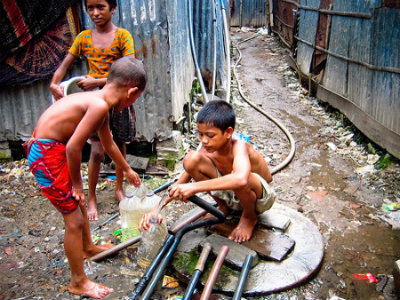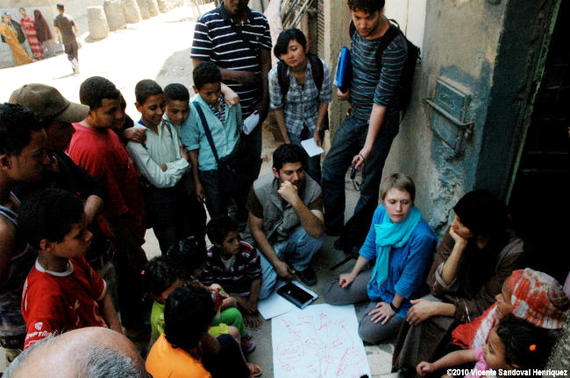The lack of infrastructure in many developing countries is a significant barrier to economic growth and social justice. Investments in transport, energy, housing, sanitation, and water can improve lives and reduce poverty. However, informal settlements are especially underserved when it comes to infrastructure, and they often lack recognition from the government as well as the means to access necessities like clean water or healthcare. Read on to discover how solutions from Dhaka, Rio de Janeiro, and Cairo are extending the benefits of formal infrastructure to the urban poor, and visit URB.im to learn more.
 For many years, the services of Dhaka's public water authority were limited to those who had legal right to their land, which meant slum residents were excluded. But today, thanks to an NGO called Dushtha Shasthya Kendra (DSK), a significant number of marginalized communities in Dhaka have access to water. In order to get around the government's fear that slum residents would not pay their utility fees, DSK designed the Watsan Project, a model whereby water access points were constructed in slum communities and then connected to the public water mains. Access to these water points costs just Tk. 50 per month, and security deposits help ensure that the public authority's fees are paid on time. Not only does this model provide clean water to slum communities, it also provides residents with trainings on the maintenance of facilities, hygiene, and healthy practices.
For many years, the services of Dhaka's public water authority were limited to those who had legal right to their land, which meant slum residents were excluded. But today, thanks to an NGO called Dushtha Shasthya Kendra (DSK), a significant number of marginalized communities in Dhaka have access to water. In order to get around the government's fear that slum residents would not pay their utility fees, DSK designed the Watsan Project, a model whereby water access points were constructed in slum communities and then connected to the public water mains. Access to these water points costs just Tk. 50 per month, and security deposits help ensure that the public authority's fees are paid on time. Not only does this model provide clean water to slum communities, it also provides residents with trainings on the maintenance of facilities, hygiene, and healthy practices.
In Rio de Janeiro, the Municipal Secretariat of Public Works is in charge of overseeing construction, reform, and maintenance for Rio's entire public infrastructure. To help the secretariat effectively and efficiently manage its many projects, a public company called RioUrbe was created in 1986. It acts as the secretariat's technical arm to coordinate project design, procurement, construction, and supervision of public works. Two of its maintenance initiatives, focusing on schools and health centers, deserve particular attention. The "Maintaining Schools" initiative, which affects 1,316 education centers and approximately 740,000 students, is responsible for the upkeep of schools and childcare centers. It also invests in small reforms to ensure that schools are accessible to children and teachers with disabilities. Rio's public health network receives support from a similar project called "Maintaining Hospitals," which makes sure that all of its centers have adequate structures, ventilation, light, and accessibility features. The initiative oversees the maintenance of 20 hospitals, 9 health institutes, and 76 basic health centers, and it also creates a significant number of jobs in the health care sector.
 In Cairo, an international enterprise called the German Society for International Cooperation (GIZ) partners with government officials and residents of the city's informal settlements to link these communities to the formal urban grid. GIZ installs water pipes, sewage systems, and roads, and supports efforts to obtain gas, electricity, and water subsidies for the settlements it serves. GIZ's distinguishing factor is that it uses a Participatory Development Program, which encourages local communities to take part in the decision-making process, and provides ways for these communities to discuss their needs with public officials. This allows GIZ to propose customized solutions and also gives impacted residents a sense of ownership in the projects and newly built infrastructure.
In Cairo, an international enterprise called the German Society for International Cooperation (GIZ) partners with government officials and residents of the city's informal settlements to link these communities to the formal urban grid. GIZ installs water pipes, sewage systems, and roads, and supports efforts to obtain gas, electricity, and water subsidies for the settlements it serves. GIZ's distinguishing factor is that it uses a Participatory Development Program, which encourages local communities to take part in the decision-making process, and provides ways for these communities to discuss their needs with public officials. This allows GIZ to propose customized solutions and also gives impacted residents a sense of ownership in the projects and newly built infrastructure.
Whether it is through a government-affiliated company or innovative civil society organizations, expanding basic infrastructure to include marginalized communities is a crucial step toward eradicating urban poverty. Visit URB.im to read more about these solutions and to share your thoughts.
Photo credits: Water.org and Vincent Sandoval Henriquez